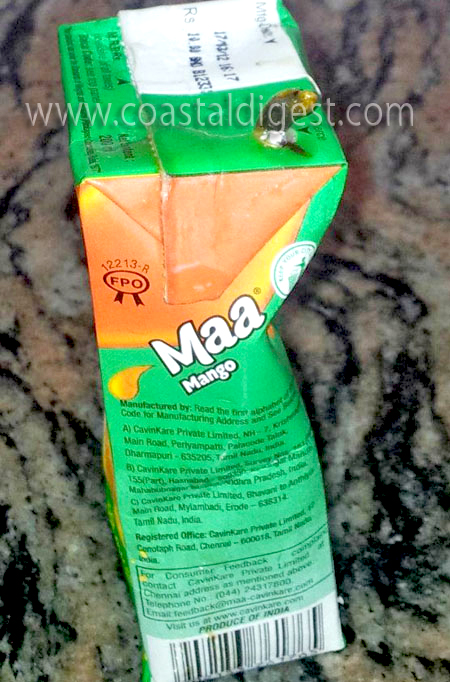
Bhatkal, June 7: Police in the town have asked all the soft drink sellers not to sell 'Maa' mango fruit juice after a dead snake was found in a 200 ml tetra pack purchased by a local resident.
One of the two persons, who fell ill after consuming the juice from the snake-filled Maa pack three days ago, has still not recovered and undergoing treatment at a hospital in Kundapur.
Sayyad Mohammad Safwan, a resident of Good Luck road in Bhatkal had bought some tetra packs of the juice for consumption last Monday.
When his sister Saheefa (22) was drinking the juice using a straw, she felt some problem in sipping the juice. Her mother Umme Salma (45) also tried to sip the juice with help of straw. She grew suspicious and opened the packet slightly to witness a six-inch long dead snake inside the pack.
Within minutes both mother and daughter began vomiting and they were shifted to a hospital immediately.
Later, Safwan informed about the snake-filled pack to the owner of 'A-1 Bakery', from where he had bought it and in turn the owner informed the manufacturers.
On Wednesday Bhatkal town police asked all the soft drink sellers not to sell any tetra pack of 'Maa' bearing manufacturing date of March 17, 2012 and batch number B1233.
Shock
Sources said that the mother and daughter who shared the poisonous juice are still under shock. Though the mother has slightly recovered, she is still not taking food properly.
Dr Jalaluddin, who is treating the victims, said that the duo need some time to forget the incident and recover completely. However, he confirmed that both were out of danger.







Comments
u craps i dont want to know about the mother and daughters condition
i need to know about that fruti
is it from the real manufacture
have u tested the fruti in the lab
what is the report or status about that case now
Add new comment